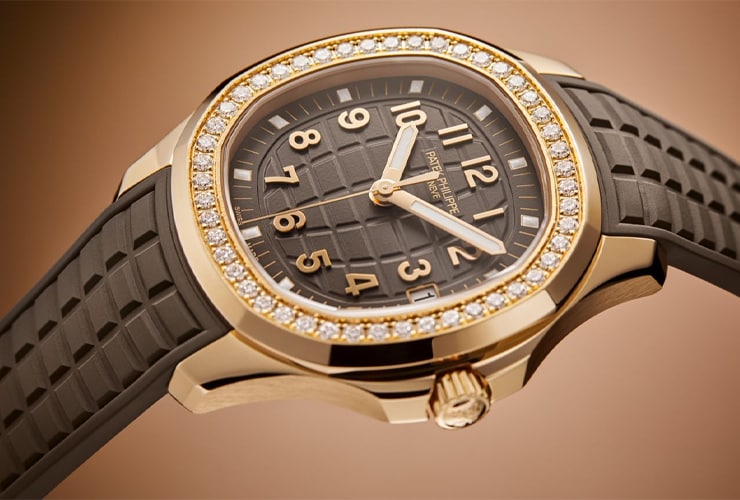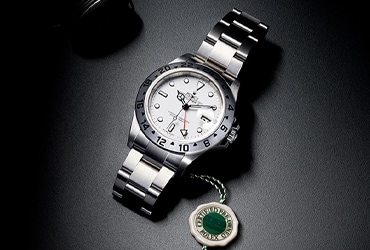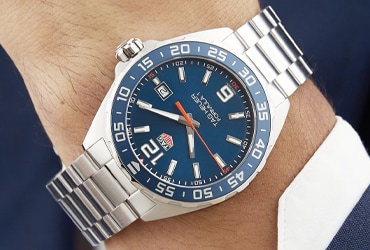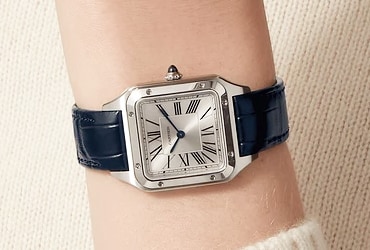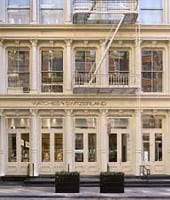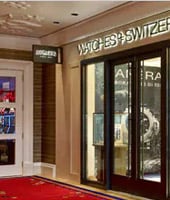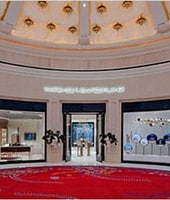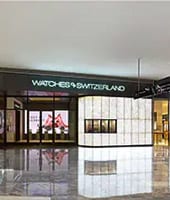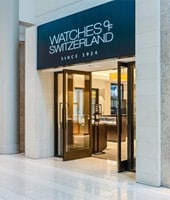Glossary
Navigate your way through all the horological Jargon with
our Handy glossary
our Handy glossary
A
Aperture
A small opening in the dial of a watch in which indications such as the day or date are given.
Automatic
A watch with a mechanical movement that is charged by the motion of the wearer's arm rather than by hand-winding the crown. Automatic watches have a power reserve - usually at least 36 hours - but if the watch is not worn during that time it will wind down and require recharging by motion of the arm.
B
Barrel
A cylindrical box in which the mainspring of the watch is housed. The toothed rim of this barrel drives the train of the watch.
Bezel
The ring surrounding the watch dial, which can be set with diamonds or inscribed with numeric markings.
Bi-directional rotating bezel
A bezel that can be rotated both clockwise and counter-clockwise for use in calculations such as average speed or distance. A uni-directional bezel turns in only one direction.
Breguet hands and numerals
Abraham-Louis Breguet was a Swiss watchmaker, often described as one of the fathers of watchmaking. He invented the tourbillon in 1801, and lends his name to 'Breguet hands' that feature a 'moon' tip loop near the end, and the slanting serif Arabic 'Breguet numerals', both of which first appeared in 1783.
C
Cabochon
A dome-like polished precious stone or gem, often used to decorate the lugs or crown on a watch.
Calibre
Movements are normally given names to distinguish them before they are installed into a watch case. This could be a word or number, depending on the brand.
Case
The main body of a watch, which holds the movement and protects it from dust, damp and shocks. Can be made of precious metals such as gold or platinum to form the look of a watch from the exterior.
Ceramic
Ceramic is a high-tech material chosen for use in watch cases and decorative elements because it's extremely hardwearing and scratch-resistant. It's often finished with a high polish
Chapter ring
A ring- or grid-like band on the dial that can bear hour and minute numeral indexes or various other indices needed for calculation.
Chronograph
A watch with a stop/start function that enables the wearer to measure time intervals, normally up to an hour. Typically represented on the dial by a number of sub-dials, with a central seconds hand.
Chronometre
This is a watch that meets a standard set by the Contrôle Officiel Suisse des Chronomètres (COSC). The watch will have undergone precision tests at different temperatures, in different atmospheres, and will have obtained a certificate, usually included with purchase.
Complication
A feature on a watch that is additional to its normal time-keeping function, including calendars, moon phases, alarm clocks, repeating mechanisms, second time zones and chronographs.
COSC
The COSC (Contrôle Officiel Suisse des Chronomètres) awards the title of 'chronometre' to each watch that passes the bureau's 15 days of tests, including testing for accuracy and consistency in different positions and at different temperatures.
Crown
A button found on the outside of the watch case which can be used for winding the mainspring, and setting a watch to the correct time, date etc
D
Dauphine hands
A popular hand design. Dauphine hands are wide, tapered and feature a facet running down the middle of the hand.
Dial
The face of the watch which displays all the watch functions, from power-reserve indicators to chronograph sub-dials. Can also feature special materials such as mother-of-pearl, or treatments such as guilloché or Clous de Paris patterns.
Divers' watch
Designed to withstand the most demanding environments, so usually featuring exceptional water-resistance (sometimes in excess of 1,000m), as well as rubber straps, screw-in crowns, push pieces and a uni-directional rotating bezel for safety. (See water-resistance)
DLC
Diamond-like carbon is a form of carbon that displays some of the unique properties of natural diamond. When applied to watches, it produces a grey/black finish that is highly scratch- and corrosion-resistant.
Dual time zone (GMT)
A watch that can display more than one time zone by means of a sub-dial or an extra hand.
E
Enamel
A translucent substance that takes on different colours by adding metallic oxides. When heated, it acquires a glass-like consistency. It can be applied in a single colour on a dial, or used to create decorative motifs.
Escapement
The device in a mechanical movement that controls the timing through rotation of wheels and consequently the movement of the hands. It is responsible for the ticking sound of a watch.
F
Flinqué
A type of concentric dial engraving, performed by hand or machine, that creates either straight or wavy lines.
Flyback
Enables the wearer to reset and immediately restart a chronograph by pressing once on the push piece.
G
Geneva Seal
Sometimes referred to as the Geneva Hallmark or Poinçon de Genève, it is a awarded to watch movements of the highest quality manufactured in the Canton of Geneva. Watch movements that pass the bureau in Geneva's 12 criteria are stamped with the seal
Grande complication
A mechanical watch featuring several complications.
Guilloché
A type of decoration for a watch dial which is usually applied to silver or silvered dials to add depth.
H
Hacking seconds
A watch with hacking seconds can be set accurately because when the crown is pulled out, the seconds hand stops.
Hand
There are usually three hands to indicate hours, minutes and seconds. They appear in various styles (see Dauphine and Breguet) and materials.
Helium escape valve
Only found on diving watches, these allow gases trapped inside the watch to escape during diving. Often the watch wearer will need to unscrew the valve manually. Of course, automatic helium valves do not require any manual operation.
Horology
The art and science of making watches.
L
Lugs
Extensions from both ends of the case, normally in the same metal and sometimes cast from the same piece of material, between which a strap or bracelet is fastened.
Luminescent
Describes a material that emits light. The hands, numerals and hour markers of watches are often coated with a luminescent material, such as SuperLuminova, to provide better legibility in low-light conditions.
M
Mainspring
A spiral spring of metal ribbon, housed in the barrel, which when wound provides the source of power in a mechanical watch
Manually wound
A watch with a movement that is charged by hand-winding the crown. Like automatics, manually wound movements also have power reserves.
Minute repeater
A high-end complication that can sound the time in hours, quarters and minutes at the push of a button.
Moon-phase display
An aperture in the dial that graphically displays the different phases of the moon, indicating whether it is new, full, waxing or waning.
Mother-of-pearl
Iridescent material taken from the inside of shells. Normally white, but can be coloured pink, grey or blue. When used on watch dials, it reflects light and colour and adds a delicate, feminine finish.
Movement
An assembly that consists of all the main mechanisms of a timepiece, including the mainspring, escapement and the winding and setting mechanism.
P
Perpetual calendar
A watch capable of telling the day, month, date and sometimes even the moon phase without the need for adjustment, even in a leap year.
Power reserve
The length of time a mechanical watch will run for once it has been fully wound. Some designs have a power reserve indicator on the dial.
PVD
Physical vapour deposition is a method of coating watch cases whereby titanium nitrate is applied in a vacuum and then covered by a coating of gold to obtain a gold-coloured finish.
Q
Quartz movement
A movement powered by an oscillating quartz crystal, which draws power from a small battery that must be replaced every two to three years. The quartz crystal is extremely accurate.
S
Sapphire crystal
The transparent cover of a watch face that protects the dial and hands. Made of synthetic sapphire, it is highly scratch- and shatter-resistant.
Screw-down crown
Commonly found on diving watches, a screw-down crown can be screwed tightly into the case to prevent water from entering. The push-buttons on a chronograph can also sometimes be screwed down.
Skeleton movement
A movement where the plates, bridges and wheels have been cut away to reveal the layers of working parts. The movement can then be admired through two sapphire crystals on the case front and back.
Sub-dial
A smaller dial within the main dial of a watch, displaying an additional function, such as a calendar or an interval measured by a chronograph.
T
Tachymetre
An instrument used in conjunction with a chronograph to measure speed, normally in kilometres per hour. Appears on the bezel or flange (area raising the crystal above the dial)
Telemetre
A telemetre scale is used in conjunction with a chronograph to measure the distance between an event and the watch wearer based on the speed of sound.
Tonneau
A watch shape with two convex sides, inspired by the form of a barrel. 'Tonneau' is French for barrel.
Tourbillon
A type of mechanical clock or watch escapement invented by Abraham-Louis Breguet in 1801 to counter the effects of gravity and other forces that affect the accuracy of a watch movement. It is one of the most challenging watch mechanisms to make, and still considered a superlative complication.
V
Vibration
Movement of an oscillating wheel from one location to its opposite - the 'tick'.
W
Water-resistant
A watch with 50 metres water resistance can be splashed without letting in water. With 100 metres, it can be used for swimming and light snorkelling. With 200 metres, for serious water sports. For diving, it is recommended to have at least 500 metres water resistance. Water resistance is normally referenced in metres or ATM (atmospheres). One ATM is roughly equal to 10 metres.
Back To Top

